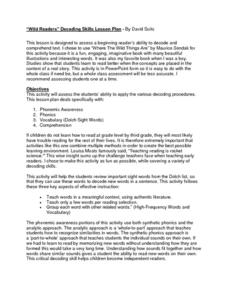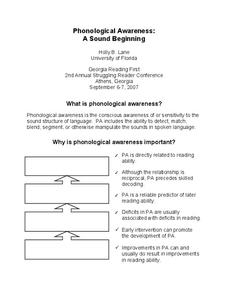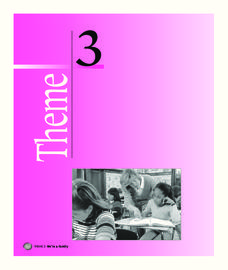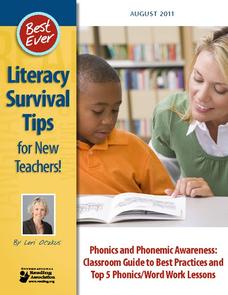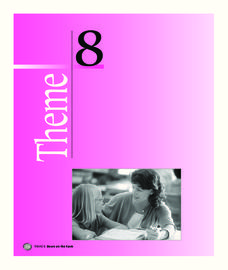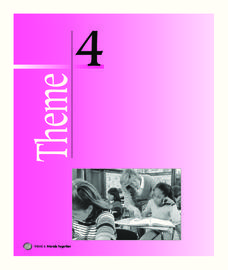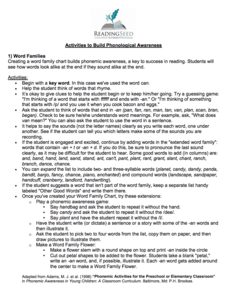Florida Center for Reading Research
Rhyming A-LOT-OH!
Rhymes are a great way to help your scholars with phonemic awareness and word relationships. Kids work with partners to match cards from a stack to their rhyming counterparts on a game board. There are six different boards, so this will...
David Suits
“Wild Readers” Decoding Skills Lesson Plan
Set young readers on the path toward fluency with this phonemic awareness resource. Based on the award-winning children's book, Where the Wild Things Are, this lesson allows beginning readers to practice isolating phonemes and...
University of Florida
Phonological Awareness: A Sound Beginning
Choose from a variety of phonological activities to complement a reading lesson. The guide goes through the basic components of good phonics instruction focusing on sound types, levels of phonological awareness, assessment methods, and...
University of Texas
Alphabetic Understanding, Phonics, and Spelling
Have your youngsters reading in no time with with collection of literacy activities and lessons. Starting with a basic understanding of the alphabet, this unit progressively builds students' phonemic awareness and ability to decode and...
Houghton Mifflin Harcourt
We’re a Family: English Language Development Lessons (Theme 3)
Teach your English language learners how to talk about their families with three weeks of lessons. Over the course of the thematic unit, learners pick up new vocabulary so that they can talk about families and relationships, clothing,...
Houghton Mifflin Harcourt
A World of Animals: English Language Development Lessons (Theme 10)
Animals are the theme of this series of English language development lessons. Scholars take part in grand conversations about woodland, jungle, and grassland animals. They also go on picture walks, read poems and high frequency words,...
International Reading Association
Literacy Survival Tips for New Teachers!
Whether new to teaching or a seasoned pro, this 12-page phonics and phonemic awareness guide is a must for your curriculum library. Everything from a summary of research on the topic to exercises and activities is included.
Houghton Mifflin Harcourt
Down on the Farm: English Language Development Lessons (Theme 8)
Down on the Farm is the theme of this series of ESL lessons designed to support reading, speaking, and listening skills. Over three weeks, your learners will have the opportunity to sing songs, play guessing games, create masks, role...
Texas Center for Learning Disabilities
Second and Third Grade Explicit Phonics Intervention
Support all young learners on their journey to literacy with this five-lesson reading intervention unit. Following a clearly outlined format, each lesson first engages children in practicing their phonemic awareness and phonics skills...
Achieve3000
Discriminating Phonemes 2
Some sounds sound very similar! Help your class learn how to distinguish between various sounds by following the steps outlined in this plan. The plan includes a warm-up, a teacher-led portion, and details for guided and independent...
Houghton Mifflin Harcourt
Down on the Farm: Extra Support Lessons (Theme 8)
Chants, rhymes, practice pages, picture, word, and punctation cards provide extra support for reading high-frequency words, substituting, blending, segmenting, and identifying phonemes in this Down on the Farm themed unit.
Houghton Mifflin Harcourt
Let’s Count!: Extra Support Lessons (Theme 5)
In a themed series of lessons and activities, beginner readers are given extra support in reading through chants, games, and practice worksheets.
Houghton Mifflin Harcourt
Friends Together: Extra Support Lessons (Theme 4)
Friendship is the theme in this series of extra support lessons. With a variety of resources (practice worksheets, letter, word, punctuation and picture cards), young readers gain knowledge of initial consonants v and h, blending short...
Curated OER
Connecting Letters and Memory
Elementary students with mild to moderate mental disabilities use a variety of tools to connect letter sounds to images. They use flash cards, posters, and writing while saying to connect letter image to phonemic equivalent. Then, they...
Houghton Mifflin Harcourt
All Together Now: English Language Development Lessons (Theme 1)
All Together Now is the theme of this series of ESL lessons. Provide support to your language learners through games, role play, stories, and discussions all about greeting others, giving commands, telling about themselves, and being...
Houghton Mifflin Harcourt
Surprise!: Extra Support Lessons (Theme 2)
Surprise! is the theme of a unit covering such topics as consonants, blending, short vowels sounds, high frequency words, and number words. The unit's lessons also include teachable moments covering story structure, illustrations,...
Houghton Mifflin Harcourt
Friends Together: English Language Development Lessons (Theme 4)
Enjoy this thematic friendship unit compiled with ESL lessons to develop strong language development while listening, speaking, looking, and moving. Class members participate in activities covering topics like making friends, asking for...
Curated OER
Using Poetry in Teaching Reading to Special Education Students
A series of well-written activities, these lessons prompt middle schoolers reading below grade level (at a second, third, or fourth grade level) to use poetry to practice basic reading skills. They rhyme, build words, make inferences,...
Houghton Mifflin Harcourt
A World of Animals: Extra Support Lessons (Theme 10)
Provide extra support with this collection of animal-themed lessons. Early readers gain proficiency in high frequency words are and he, practice blending short vowel sounds, and substitute initial and final phonemes while creating...
Texas Center for Learning Disabilities
Second-Grade Explicit Intervention
Unfortunately, not all students learn to read at the same pace, but with the help of this resource, you can ensure that they all receive the support they need to reach this important goal. Comprised of short literacy activities, these...
Houghton Mifflin Harcourt
Wheels Go Around: English Language Development Lessons (Theme 7)
Wheels go around is the theme of the plethora of activities to aid in the language fluency of your scholars in this unit of ESL lessons. Learners can take part in a grand conversation focused on wheels, make their own steering wheel,...
Literacy Connects
Activities to Build Phonological Awareness
Begin your reading program each day with a mini lesson on phonological awareness using these engaging activities listed in the resource. Young ones will enjoy word families, clapping and counting syllables, identifying single sounds and...
Houghton Mifflin Harcourt
Spring Is Here: Extra Support Lessons (Theme 9)
Spring is the theme of this unit of extra support lessons. Your early readers enhance their skills using chants, practice worksheets, picture cards, and alphabet cards. Topics include identifying syllables, beginning sounds /w/, /g/,...
Core Knowledge Foundation
Kindergarten Skills Unit 7
A unit consists of seventeen lessons that examine six new consonant digraphs. Lessons review past concepts, introduce sounds and spelling, and offer differentiated instruction in small groups. Learners begin reading a decodable story and...



